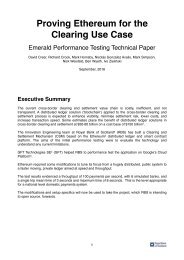Bitcoin and Cryptocurrency Technologies
1Qqc4BN
1Qqc4BN
Create successful ePaper yourself
Turn your PDF publications into a flip-book with our unique Google optimized e-Paper software.
These kinds of agreements — to raise prices or to not compete — are illegal in most jurisdictions. This<br />
is part of antitrust law or competition law. The goal of this body of law is to prevent deliberate actions<br />
that prevent or harm competition. More generally, it limits actions other than simply offering good<br />
products at good prices, such as attempts to reduce competition through mergers. Antitrust law is<br />
very complicated <strong>and</strong> we’ve given you only a sketch of it, but it’s another instance of how the market<br />
can fail <strong>and</strong> how the law can <strong>and</strong> will step in to prevent it.<br />
7.8: New York's BitLicense Proposal<br />
So far we’ve discussed regulation in general: different forms of regulation, why regulation might be<br />
justified in some cases <strong>and</strong> might make good economic sense. Now let’s turn to a specific effort by a<br />
specific state to introduce specific regulation of <strong>Bitcoin</strong>, namely New York State’s BitLicense proposal.<br />
The information here is current as of early 2015, but the l<strong>and</strong>scape of <strong>Bitcoin</strong> regulation changes<br />
quickly. That doesn’t matter much for our purposes, because our goal isn’t so much to help you<br />
underst<strong>and</strong> a specific piece of actual or proposed regulation. Rather, we want to help you underst<strong>and</strong><br />
the kinds of things regulators are doing <strong>and</strong> give you a sense of how they think about the problem.<br />
The BitLicense proposal was issued in July 2014 <strong>and</strong> has since been revised in response to comments<br />
from the <strong>Bitcoin</strong> community, industry, the public, <strong>and</strong> other stakeholders. It was issued by the New<br />
York State Department of Financial Services, the part of the state of New York that regulates the<br />
financial industry. Of course, the state of New York has the world’s largest financial center, <strong>and</strong> so it's<br />
a part of the state government that is used to dealing with relatively large institutions.<br />
Who’s covered.BitLicense is a proposed set of codes, rules, <strong>and</strong> regulations that has to do with virtual<br />
currencies. Fundamentally, it says that you’d need to get something called a BitLicense from the New<br />
York Department of Financial Services if you wanted to do any of the things listed in the box below:<br />
Virtual Currency Business Activity means the conduct of any one of the following types of activities<br />
involving New York or a New York Resident:<br />
1. receiving Virtual Currency for Transmission or Transmitting Virtual Currency, except where<br />
the transaction is undertaken for non‐financial purposes <strong>and</strong> does not involve the transfer<br />
of more than a nominal amount of Virtual Currency;<br />
2. storing, holding, or maintaining custody or control of Virtual Currency on behalf of others;<br />
3. buying <strong>and</strong> selling Virtual Currency as a customer business;<br />
4. performing Exchange Services as a customer business; or<br />
5. controlling, administering, or issuing a Virtual Currency.<br />
The development <strong>and</strong> dissemination of software in <strong>and</strong> of itself does not constitute Virtual<br />
Currency Business Activity.<br />
212









